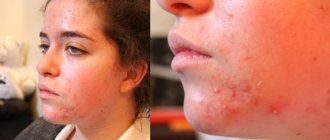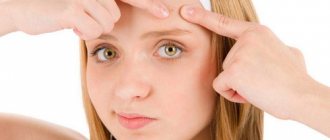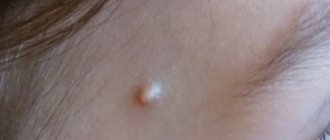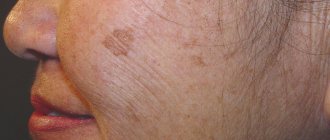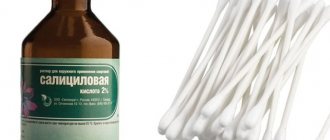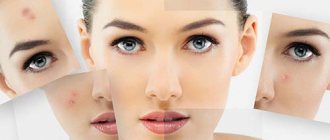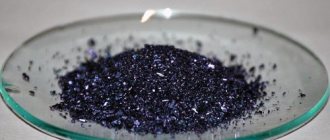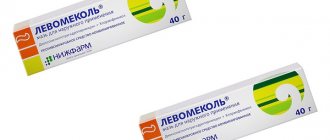Why is it important?
Usually, acne occurs for obvious reasons. Diseases, improper skin care, unhealthy lifestyle, vitamin deficiency, etc. but people rarely think about how much influence our psychological state has on our lives.
For example, scientists have repeatedly proven that stress greatly weakens the body's immune system and makes a person vulnerable to diseases - both viral and bacteriological.
We even recently wrote a detailed article about how it can affect acne.
But today we are talking about something else. If in most cases the causes of acne are quite objective and understandable, then sometimes acne appears due to psychosomatics.
The topic is broad, but quite interesting. And we will try to reveal it as fully as possible, talking about the root causes of this phenomenon and ways to combat it.
In addition, we will also touch on the factor of complexes. Cases when a person believes that there is something wrong with his appearance, and in the end actually provokes the emergence of real problems with his appearance.
What is the psychosomatics of acne on the face and body?
To begin with, we will explain what it is, a psychosomatic disease. This is necessary because some people mean one thing by it, but in reality the term means something completely different.
Psychosomatics is a whole direction in medicine that studies the influence of psychological problems on the real state of human health. Experts in this field pay special attention to the psychological characteristics of specific people. This is necessary to study the ailments that arise in them for psychosomatic reasons.
But diseases of this type are diseases whose cause does not lie in infections, bacteria or dysfunction of organs. And in the mental state of a person.
This does not mean that in fact there is no disease - it is simply caused by our brain, and not by external influences.
Psychosomatic diseases are diseases the causes of which are more the mental processes of the patient than any direct physiological causes.
If medical examination cannot detect a physical or organic cause of the disease, or if the disease is the result of emotional states such as anger, anxiety, depression, guilt, then the disease may be classified as psychosomatic. Source
Psychosomatics of acne on the face and body: causes
On this basis, both truly serious diseases and dysfunctions and milder disorders can manifest themselves: for example, acne.
In such cases, the root of the problem is not that you are not properly caring for your skin or that there is something wrong with your body. Here the reason lies in the fact that the person is overthinking himself or is afraid of something.
In this case, most often there are complexes about appearance. This especially applies to women. Ladies often overindulge themselves and worry too much about looking good, often forgetting about their health - both physical and mental.
Reasons according to LeCron:
There are only a few reasons for the formation of any psychosomatic disease, including acne. For example, the famous psychologist Leslie LeCrone identifies 7 main factors:
- conflict. In this case, what is meant is not a conflict between one person and another, but rather internal disagreements with oneself. This situation arises when a person, for example, has desires that contradict his principles, morals, or concepts of “good” and “right.” This rarely means that the person wants to do something illegal. This refers to taboos that we invent for ourselves or that are formed in the process of strict education;
- body signals. This concept means a state in which our well-being could be completely reflected by any of the figurative expressions, like: “This is a complete headache.” A striking example of this would be the actual occurrence of constant migraines when interacting with an object to which the above expression applies;
- conditional benefit. This defines a situation in which a person begins to suffer from a disease that at the moment can bring him some benefit. The most striking example is when a student suddenly falls ill with the flu right before a test he doesn’t want to take. And no, he is not pretending - the symptoms are real, only their cause is not an infection, but a psychosomatic one;
- past experience. This refers to diseases that arise as a result of any psychological trauma or negative emotional episode from the past. For example, childhood trauma;
- identification. This is the name for a situation in which a person strongly identifies with another person who suffers from a certain illness. In this case, the patient exhibits symptoms of the illness of the person with whom he identifies;
- self-suggestion or external suggestion. When a person convinces himself of the presence of a certain disease, and later actually discovers its symptoms. A similar situation can be observed when the presence of the disease is suggested to the patient by someone else, for example, doctors or hypochondriac parents;
- self-punishment. It arises as a result of a feeling of real guilt that a person experiences. He begins to reproach himself for what he has done and convince himself that he deserves punishment for it. And the punishment actually occurs - the symptoms of a certain disease begin. In this case, the disease will also be psychosomatic.
And this does not mean that you need to immediately go to a psychiatrist. Indeed, if psychosomatic diseases are serious (for example, often people even lose the ability to walk due to nervousness), then contacting a specialist is necessary. However, in the case of ordinary acne, this is much easier to solve.
Louise Hay and her table of diseases
Louise Hay's books have helped many people get rid of psychosomatic illnesses and have become a discovery in this area. In one of them, the author presents a table indicating diseases and the causes of their occurrence. About acne it says:
| Acne | Appear from small outbursts of anger. | To get rid of them, you need to relax and find peace of mind. |
| Pimples | Low self-esteem, self-rejection. | You need to learn to love yourself for your achievements and talents. You need to understand your uniqueness. |
| Whiteheads | Not love for your appearance. | You need to find something beautiful in yourself. Be it your eyes or your smile, and love yourself for it. |
Louise Hay notes that after experiencing the table on themselves, many received a surge of energy and healed their soul and body. She advises reminding yourself twice a day of peace in your soul, your uniqueness, and love for your body.
Liz Burbo's theory
She claims that if pimples appear and disappear, this indicates intolerance to change and an unwillingness to accept the disruption of plans. This is how mild anger expresses itself. Liz Burbo advises paying attention to where acne occurs, finding out the meaning and taking action. It’s worth learning to be flexible and calmly accept surprises.
In her book “Heal Yourself,” she claims that pimples and acne are due to incorrect attitudes. We need to rebuild them into harmonizing thoughts: “I can handle it!”, “I know that I’m not perfect, but I love myself as I am!”
How to understand that your acne is due to psychosomatics?
But what about acne? The fact is that all the factors that we listed in the previous section affect not only the sores that people experience, but also the appearance of acne.
Acne rosacea is also considered a full-fledged disease, which has its own symptoms and is treated with certain medications. Experts in psychosomatic medicine do not deny that acne on the face can also be caused by psychosomatics.
The reasons for this are no different from the psychological factors that provoke the occurrence of other diseases.
If you are punishing yourself
For example, acne may well appear from self-punishment.
Let's say a girl really wants to look good and have ideal facial features, figure, and so on. But for certain reasons she doesn’t succeed, and she begins to reproach herself for this, blaming herself for allegedly being to blame for not looking good enough. As a result, she begins to believe that she deserves punishment.
This manifests itself, first of all, externally - acne occurs that has no objective reason. And a paradox arises: You look bad because you want to look good too much.
Naturally, this needs to be treated by a psychologist, because failure to accept one’s own body and appearance is a serious problem.
When you give yourself problems with your appearance
Suggestion also takes place, although this factor is not so common in the case of psychosomatic acne. In this situation, they occur if you are sure or you are assured that you should have acne.
For example, due to the fact that you perform certain actions. Let's say you think that acne occurs because you sit at the computer too much.
Naturally, this simply cannot be - acne occurs for completely different reasons. But if a person begins to believe in it too much, then he really notices the appearance of rashes.
You are in conflict with yourself
Internal conflicts also have a huge impact on our health. For example, when it seems to you that you need to do a certain thing and that it is really necessary, but in reality you experience uncertainty and internal rejection, this causes severe stress.
Of course, this will be a huge blow to the body, which will subsequently contribute to the appearance of psychosomatic acne on the face.
Of course, girls are the ones who suffer most from these problems. Ladies are more likely to worry about their appearance, which results in severe neuroses and health problems.
Traditional recipes for acne
- Buy tea tree oil at the pharmacy. Apply it to acne 3-4 times a day.
- Before going to bed, wipe the acne on your face with laundry soap. Leave it overnight. After waking up, wash off with cold water using the same soap.
- Rubbing your face with potato juice every day helps get rid of acne.
- Wipe your face twice a day with pure aloe juice. For the best effect, first keep the cut leaves of the plant in the refrigerator for 7-10 days, and then squeeze out the juice.
The psychosomatics of a rash on the face has an invisible connection with the patient’s unexpressed negative thoughts and emotions.
The metaphysics of acne is the patient’s body’s reaction to negative moments in his emotional life.
When treatment of this skin pathology with the methods of official medicine does not bring the expected effect, undergo training in the skills of “Spiritual Integration”: use the unique chance to rid yourself or your family of psychosomatic sources and physical consequences of this disease.
Psychosomatic causes of acne: by zone
Sometimes women complain that acne appears in specific places and want to understand: is this related to psychological problems? Of course, this also happens.
Experts do not deny that, due to internal reasons, acne can affect the same, very specific areas of the face and body.
Let's look at the places most vulnerable to pimples and try to determine what psychological factors may influence the occurrence of acne specifically in these areas.
Namely: on the chin, neck, nose, forehead, chest and back. These are the parts of the body that are considered the most common sites of injury.
Acne on the chin in women: causes and psychosomatics
In fact, this area of the face rarely suffers from acne due to psychological reasons. But the problem is that it is fatty in itself - many glands are concentrated in this area, which continuously secrete fat. Because of this, acne occurs here.
The psychosomatics of acne on the chin is expressed in the fact that almost every woman tries to squeeze them out immediately after they appear. Moreover, without worrying too much about the hygiene of the procedure. Because of this, acne only gets bigger.
But do not forget that in addition to psychological factors, other factors can also influence the condition of the skin. For example, most often acne in the chin area occurs due to diseases of the body that we do not notice in the early stages.
Therefore, it is worth familiarizing yourself with the map of acne on the face , which shows which zone indicates problems with the functioning of internal organs.
Acne on the back of women: causes and psychosomatics
They say that all the problems that arise with this part of the body appear due to the fact that our psyche is affected by things that we do not want to think about.
For example, if you have a certain problem that you simply do not want to acknowledge and are simply trying to “hide”, both from others and from yourself. Of course, this mainly manifests itself in the form of constant pain, but yes - sometimes, due to psychosomatics, acne appears on the back, especially in women. Especially if the problems you want to hide are somehow related to appearance.
However, acne on the back could appear for other reasons. Therefore, we recommend that you read our article about the causes of acne in this area.
Pimples on the neck: psychosomatics
In general, acne in this area is extremely rare. The thing is, there aren't that many pores, and you actually have to work really hard to get breakouts.
Therefore, the causes of acne on the neck are sought in psychosomatics or illness. And psychological problems here are more of an indirect cause than the main one.
The fact is that a person tends to rub his neck when he feels insecure and lack of support. It is because of these constant touches that acne can occur.
Acne on the chest from psychosomatics
Acne in this area is also considered rare, although the skin here is quite vulnerable. However, psychologists exclude the possibility of acne on the chest from psychosomatics. Perhaps you are used to rubbing or scratching the skin in this area when you are nervous or anxious.
But acne on the chest can also appear for other reasons. For example, a simply uncomfortable bra or poor-quality clothing. Therefore, immediately attributing everything to psychosomatics and forgetting is a bad tactic. We recommend that you read our article about why acne may occur in the chest area.
Pimples on the forehead: psychosomatics
If a person is used to hiding his problems from others, then he experiences constant stress.
In particular, if you are overly demanding of yourself and believe that any troubles simply shouldn’t arise (you’re used to thinking that difficulties are normal for anyone, but not for you), then due to psychosomatics, acne appears on your face. forehead.
There is some logic to this. What you are trying in every possible way to hide creeps into the most visible place. This suggests that sometimes it is worth showing your weaknesses and asking others for help.
Pimples on the cheek: psychosomatics
Acne in this area is rarely associated with psychosomatics. Most often, the reason is stress, as there are a huge number of pores and glands that can cause acne on the cheeks. This intensifies when the body weakens due to nervousness.
Prevention
Psychosomatics studies the relationship between diseases and the mental state of patients. The basis of prevention is working on the perception of the world and the emotional background. Doctors advise learning to protect yourself from stress and negative emotions. Yoga will have a positive effect if there is no way to avoid external influences. In addition to working with your feelings on your own, it is advisable to consult a specialist. A significant part of working with such a patient is an attempt to increase self-esteem. It is from non-acceptance of oneself that all consequences flow.
Acne on the body is the result of internal experiences and conflicts. Psychosomatics claims that you should always pay attention to psychological problems. They influence the condition of all organ systems. The skin shows problems in the form of acne. Each problem area indicates a specific disorder. The basis of treatment is working with a psychotherapist, psychologist, increasing self-esteem, and getting rid of stress.
There is some connection between mental health and the appearance of acne. After all, any rashes indicate not only problems of internal organs, but also reflect the emotional state of a person. The psychosomatics of acne reflects its interaction with the outside world. This explains why rashes are a chronic problem among teenagers.
Boys and girls with problem skin try to minimize communication with others, considering themselves ugly. They stop playing sports to expose their bodies less. Such problems can last a lifetime. Therefore, having already found their own family, people cannot fully open up to their partner and enjoy life to the fullest.
Psychologists say that acne is the body’s reaction to intolerance or a change in plans. As soon as a person tries to suppress his anger, the skin begins to suffer.
